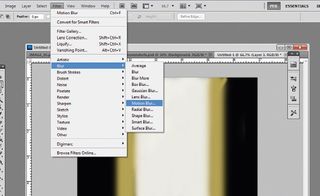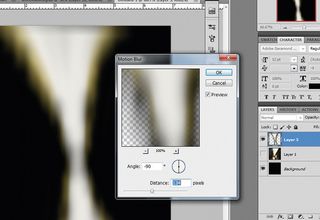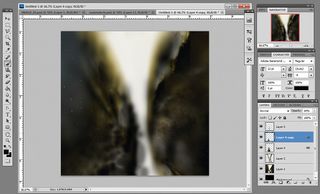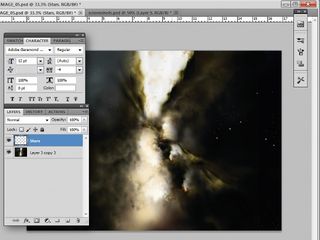Albion on making the world a better place
Glyn Britton, Jonty Sharples, Matt Roskill and Andy Beaumont explain the ethos behind London agency Albion
This article first appeared in issue 236 of .net magazine – the world's best-selling magazine for web designers and developers.
.net: Albion: Where does the name come from?
GB: It’s inspired by the agency New Albion from George Orwell’s novel Keep The Aspidistra Flying: “The interesting thing about the New Albion was that it was so completely modern in spirit. There was hardly a soul in the firm who was not perfectly well aware that publicity — advertising — is the dirtiest ramp that capitalism has yet produced.”
JS: I’m almost certain that on a brisk September morning in 2002, Jason Goodman peeped out of his window and – in a flash of inspiration we can only gawp at – named his new company after the street sign he saw across the road. It’s right up there with pinching memes from YouTube in order to sell mineral water. We’re justifiably proud of this elephantine feat of creativity.
MR: When the Romans first landed on these shores, the indigenous Brits were far from the tanned gods that visiting tourists encounter today. In fact, we were so pasty white that they branded us albinos. And ancient history’s first example of branding inspired a young(er) Jason Goodman to adopt the name Albion. That, or he thought a name beginning with ‘a’ meant it’d be at the top of the ‘advertising agency’ section in the Yellow Pages.
AB: It’s named after the caf behind the Tea Building (our office in Shoreditch).
.net: Tell us a bit about your history.
GB: We’ve been a different agency for every one of our 10 years. We started by wanting to be ‘not advertising’. We’ve embraced change, and constantly tried new things; things that would help us deliver our positioning of being a ‘creative business partner for entrepreneurs’.

.net: How did you attract those big name clients?
GB: By understanding, and being part of, the entrepreneurial startup culture that they come from. And by showing them an entrepreneurial approach to marketing: that we can help them with strategy, branding, product and communications, all wrapped up in a commercial and user-centred approach; and that we can work fast and hard.
MR: Our attitude reflects their own. They believe in challenging the status quo in their industry, and that’s exactly why we set up Albion 10 years ago. We share the same values and that means exciting, young businesses (often with a niche or complicated product proposition they want to make mainstream) naturally gravitate towards us.
JS: Our roots are akin to that of a startup, and we have an attitude that sets us apart; where many agencies will only see a small budget and a fledgling product we see potential, and our process is tailored specifically to that natural disruptive streak you only really get in the startup mindset.
.net: So have you won lots of awards?
GB: No, not really. There aren’t many awards that reward what we get our kicks from – being part of teams that create disruptive businesses.
MR: We don’t really covet creative awards in the same way other agencies do. Perhaps that’s been to our detriment. But for us, the greatest award is a happy client whose business we’ve helped become a genuine game-changer. And we’ve had plenty of those over the last 10 years.
JS: I’m not sure we even submit for awards. We’re not that kind of agency.

.net: What’s wrong with being just an agency?
GB: Nothing I suppose. But we don’t think our future is only in client service, which is what the agency work implies. The agency business is being reinvented around us, as dramatically as newspapers, music and movies have been before, all caused by the internet. Yet most people working in agencies don’t seem to realise that. We think we need to regularly question everything about being an agency, just to survive as one.
JS: Not much. There are some great ones out there, but as with many UX agencies who successfully managed to transcend the agency model to become consultants, I think that’s where we see ourselves with our clients, consultants and strategic partners.
.net: Why should an agency worry about its clients’ entrepreneurial drives? Shouldn’t you just get a handle on their brands?
GB: We’re mostly creating new brands, or giving new life to stagnant ones, so there’s nothing existing to get a handle on other than the entrepreneurial founders’ passion and sense of purpose. Also we enjoy working with entrepreneurial people the most, because we thrive on their energy and learn most about new ways of working from them.

.net: Startups are nimble. Does this swiftness pose problems for traditional agencies?
GB: Yes. Startups are ‘nimble’, which often looks a lot like ‘chaotic’ and ‘fickle’ – all things that big, hierarchical, process-led agencies aren’t very good at coping with. People in traditional agencies criticise us for not being strategically consistent, by which they mean we don’t execute the same idea for five years in a row. But for our clients, long-term planning means three months, and because they’re trying to disrupt industries, that brings with it constant change. We have to work in a way that can keep pace with that. We’re constantly tweaking our way of working, borrowing bits from lean and agile, to find better ways of coping with this pace.
JS: Absolutely. It’s one of the reasons we love working with them. Trying to tame that energy is pointless – so much better to harness it in order to produce the amazing. Established brands are over their honeymoon period. Sometimes the spark has gone and they can’t be motivated beyond the next project cycle. Certainly they’re less motivated to think about their users. With the startup mentality the thinking is incredibly focused and driven towards user satisfaction and creating excellent experiences.
.net: So, I’ve sent my client another 1am, 1200 word essay clarifying a point. How can we actually start communicating?
GB: Pick up the phone and arrange to see them. Then have an air-clearing heart-to-heart chat. Drink way too much Cuervo together. Then, from that moment on, promise to over-communicate, by voice. Almost every problem in business (probably in life) comes down to poor communication. It’s not that difficult, if you get into good habits.
MR: If time and costs permit, get yourself physically – and regularly – inside their business. And if they don’t, rework your timings and commercials so they do. Failing all that, invite your client to spend one day a week with you. Some of our longest and strongest relationships have come about because we’ve done exactly that. I was seconded down to Betfair for nine months. Our CEO did the same at Skype. Our marketing director at eBay spent every Thursday and Friday at Albion. It’s amazing what working side-by-side can do for communication and partnership.
JS: Call. Meet. Anything other than email. We use all sorts of great tools to help us communicate with our clients and teams in and out of the UK and Europe, and with great success. There is absolutely no point in playing comms ping pong – it’s tiring and frustrating and you’ll end up resenting one another.

.net: It’s fantasy client time: who would you love to work with? What could you do for them?
GB: Not Nike. Not Coke. Not Jay-Z. What excites us is finding the intrapreneur, hidden in a previously unremarkable business, who has the ambition and drive (and business need) to try something experimental to try and change the game. That’s what we did with Unum, and what we’re now doing with Unibet. So I’d love to revive Lada, doing something really radical in the car market, not just fannying around with token battery-powered cars and silly Facebook crowdsourcing competitions.
AB: My fantasy client is Albion, I’d love to find the time to do more product development here. Making things that solve real problems is just about the most satisfying thing you can do with technology.
JS: I’d love to tackle a whopper. Something akin to the work the team at GDS have undertaken, but maybe in healthcare or transport. I’m pretty sure the NHS IT system could do with a kick in the ribs.
.net: What’s got you really excited at the moment?
GB: The team of volunteers restoring the wreck of Donald Campbell’s world water speed breaking boat Bluebird K7. I’ve just come back from holiday in the Lake District and got a bit obsessed with the whole story. Very real, very grassroots, very social, but without any marketing bullshit.
AB: The possibility of Stripe (www.stripe.com) coming to the UK: building online payment systems is a real pain. Over here GoCardless is potentially a game changer, but it has a public re-education piece to do about what it actually is and how safe it is.
MR: Mapping out the next 10 years of Albion’s lifecycle. I guess you could say we’re coming of age. We’re only now starting to grow up, so this next stage is all about us fulfilling our potential. And I don’t think anyone at Albion thinks we’re anywhere near doing that yet, which is incredibly exciting.
JS: The idea that a team not made up of civil servants can re-imagine the entire .GOV web presence in an incredibly short amount of time, and also attract some of the best talent in the country to help make it happen. That makes me feel a bit warm inside.
.net: I’m a developer. How do I catch your eye?
GB: We want people who are creative thinkers first, developers second. So demonstrating an intense interest in popular culture can help. One guy did so by hiding an Easter egg in his demo site, telling us that his favourite album was D’Angelo’s Brown Sugar. We couldn’t hire him fast enough.
AB: The first thing I look for is personal projects on GitHub. It shows some ability to generate your own ideas. I get to poke around in your commit history and see how you tick, and if you’re doing this stuff in your spare time that’s a good sign that you enjoy it.

.net: What’s been your proudest moment?
GB: I’m proud less of any particular moments, but of the longer story arcs. I’m proud to have been involved in creating the (original, good) Skype brand experience. I’m proud to have created a lot of the giffgaff brand experience. I’m proud to have created one of the most interesting agencies in the UK.
AB: Tracking down a domain owner in the Cayman Islands and persuading him to transfer his domain to us the day before a TV ad went out prominently featuring that domain.
MR: For my first six months at Albion, I worked at a makeshift desk space hidden away in corner of reception. Then one day, I was unexpectedly relocated to an actual desk complete with chair, power point and creative placement team. The recognition. The elation. I’d arrived.
JS: If we’re talking strictly about work, I’ve an immense feeling of pride in seeing the fantastic teams here grow together. There’s a growing empathy between skill sets that is hard to beat.
.net: Go on, spill the beans: what’s the weirdest request you’ve had from a client?
GB: “Can you please hand-courier a prototype of BA’s new First Class seat to Miami, flying in the old First Class.” Erm, OK.
AB: “Move the navigation 4mm to the left.”
MR: “I’ve been signed off ill from work. Can you please come and work from my kitchen?”
JS: “Can you sign up to Scruff? Ignore all the bears, check out the settings screen.”
Find out how to be a creative director at our sister site, Creative Bloq.

Thank you for reading 5 articles this month* Join now for unlimited access
Enjoy your first month for just £1 / $1 / €1
*Read 5 free articles per month without a subscription

Join now for unlimited access
Try first month for just £1 / $1 / €1
Get the Creative Bloq Newsletter
Daily design news, reviews, how-tos and more, as picked by the editors.
The Creative Bloq team is made up of a group of design fans, and has changed and evolved since Creative Bloq began back in 2012. The current website team consists of eight full-time members of staff: Editor Georgia Coggan, Deputy Editor Rosie Hilder, Ecommerce Editor Beren Neale, Senior News Editor Daniel Piper, Editor, Digital Art and 3D Ian Dean, Tech Reviews Editor Erlingur Einarsson, Ecommerce Writer Beth Nicholls and Staff Writer Natalie Fear, as well as a roster of freelancers from around the world. The ImagineFX magazine team also pitch in, ensuring that content from leading digital art publication ImagineFX is represented on Creative Bloq.
